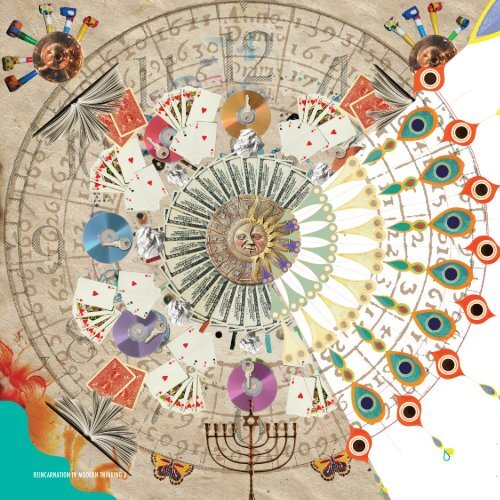REINCARNATION IN MODERN THINKING 1
You also want an ePaper? Increase the reach of your titles
YUMPU automatically turns print PDFs into web optimized ePapers that Google loves.
<strong>RE<strong>IN</strong>CARNATION</strong> <strong>IN</strong> <strong>MODERN</strong> TH<strong>IN</strong>K<strong>IN</strong>G 1
“I believe... that the soul of man is immortal and will be treated with<br />
justice in another life, respecting its conduct in this.”<br />
—Benjamin Franklin<br />
The concept of reincarnation<br />
It seems to offer one of the most attractive<br />
explanations of humanity’s origin and<br />
destiny. It is accepted not only by adherents<br />
of Eastern religions or New Age spirituality,<br />
but also by many who don’t share such<br />
esoteric interests and convictions. To know<br />
that you lived many lives before this one<br />
and that there are many more to come is<br />
a very attractive perspective from which to<br />
judge the meaning of life. On the one hand,<br />
reincarnation is a source of great comfort,<br />
especially for those who seek liberation on<br />
the exclusive basis of their inner resources.<br />
It gives assurance for continuing one’s<br />
existence in further lives and thus having<br />
a renewed chance to attain liberation. On<br />
the other hand, reincarnation is a way of<br />
rejecting the monotheistic teaching of the<br />
final judgment by a holy God, with the possible<br />
result of being eternally condemned<br />
to suffer in hell. Another major reason for<br />
accepting reincarnation by so many people<br />
today is that it seems to explain the differences<br />
that exist among people. Some are<br />
healthy, others are tormented their whole<br />
life by physical handicaps. Some are rich,<br />
others at the brink of starvation. Some<br />
have success without being religious; others<br />
are constant losers, despite their religious<br />
dedication. Eastern religions explain these<br />
differences as a result of previous lives, good<br />
or bad, which bear their fruits in the present<br />
one through the action of karma. Therefore<br />
reincarnation seems to be a perfect way of<br />
punishing or rewarding one’s deeds, without<br />
the need of accepting a personal God as<br />
Ultimate Reality.<br />
Reincarnation in the moderning thinking<br />
Understanding your past lives can be beneficial<br />
to improve the decisions you make in<br />
your life today.<br />
<strong>RE<strong>IN</strong>CARNATION</strong> <strong>IN</strong> <strong>MODERN</strong> TH<strong>IN</strong>K<strong>IN</strong>G 2
There are some simple tell tale signs that might indicate that you<br />
have had a past life and that it may be affecting or even interfering<br />
with your current life.<br />
Why you like some people and dislike others<br />
People you have an unexplained like or<br />
dislike of. This can lead to getting involved<br />
with someone in this life with whom you<br />
shared very intense emotions in a past life.<br />
Emotions tend to leave imprints from life<br />
to life and the stronger the emotion, the<br />
stronger the imprint. A very strong love<br />
can transcend from one life to another. So<br />
too can a harmful relationship. Unless you<br />
understand this, you may find yourself in a<br />
very unhealthy relationship and not know<br />
why. Often we travel together from one life<br />
to another with the same group of people.<br />
Someone who is a friend in one life can be a<br />
stranger in this one and by the same token<br />
an enemy in a past life can turn into a friend<br />
or even be born again as your own mother<br />
or father.<br />
Unexplained interest in various cities,<br />
cultures and countries<br />
You may have an unexplained longing for<br />
a place you’ve never been, such as Ireland,<br />
China, or Italy, for example or a culture<br />
you’ve never been exposed to. This may<br />
mean that in a past life you had lived in that<br />
location. For example, if you have gone to<br />
a place for the first time but seem to know<br />
things about it you would have no way of<br />
knowing, can mean that you have at one<br />
time lived in this place. A famous example<br />
of this happened to General George Patton<br />
twice – once in France and once in North<br />
Africa. He believed he was a reincarnation<br />
of the famous General Hannibal. He even<br />
wrote a poem about it his belief in reincarnation.<br />
Through the travail of the ages,<br />
Midst the pomp and toil of war,<br />
Have I fought and strove and perished,<br />
So as through a glass, and darkly<br />
The age long strife I see<br />
Where I fought in many guises,<br />
Many names, - but always me.<br />
Do you have recurring dreams?<br />
Often recurring dreams such as being<br />
drowned by large waves, fear of heights or<br />
being killed in some manner can indicate<br />
that in a past life you met your death that<br />
way. Usually, these memories also stick in<br />
your mind and are very close to the surface<br />
<strong>RE<strong>IN</strong>CARNATION</strong> <strong>IN</strong> <strong>MODERN</strong> TH<strong>IN</strong>K<strong>IN</strong>G 3
ecause of the amount of fear such a death<br />
produced. Frightening incidents in your<br />
past can also create unexplained phobias in<br />
your current life, such a fear of hospitals,<br />
needles, fire, or being left alone. Making the<br />
decision to face these can lessen and even<br />
end fears you may have in this life that cannot<br />
be explained.<br />
Having interests, talents or skills<br />
that don’t run in your family<br />
Possessing certain skill sets may also be a<br />
result of past lives. For example, why are<br />
certain people born baseball players, or musicians<br />
– for example, was Beethoven just extremely<br />
talented or had he been a musician<br />
in a past life? What about great people like<br />
Gandhi? Did his environment produce him<br />
or his genetic make up or did he develop<br />
the skills and characteristics that helped him<br />
be a great man over a series of life times?<br />
Where does your high math aptitude or<br />
musical aptitude or ease with learning a new<br />
language come from? Your parents? Your<br />
schooling? Or was it always in there waiting<br />
and just seemed to come out naturally in a<br />
way that perhaps surprised even you?<br />
Preferring one sex over another<br />
Then there are physical attributes and even<br />
sexual preference. What sex you are can<br />
change from one life to another. If you feel<br />
you are in the wrong body or if you feel<br />
attracted to someone of the same sex this<br />
could be simply because you were the opposite<br />
sex in the last life. Physical imprints,<br />
not just emotional ones can move from<br />
lifetime to lifetime and be strong enough<br />
to cause you to feel as if you should still be<br />
male or should still be female or should still<br />
be attracted to those of the same sex as you.<br />
Likewise, such things as birthmarks and<br />
physical ailments can follow you from one<br />
life to another.<br />
There are many ways to further investigate<br />
or to deal with these issues if you decide<br />
this might be something that is happening<br />
to you. One is regressing yourself. Another<br />
is to find a qualified past life regression<br />
therapist.<br />
<strong>RE<strong>IN</strong>CARNATION</strong> <strong>IN</strong> <strong>MODERN</strong> TH<strong>IN</strong>K<strong>IN</strong>G 4
GREAT BRITA<strong>IN</strong><br />
33%<br />
PORTUGAL<br />
31%<br />
AUSTRIA<br />
&<br />
ITALY<br />
N. IRELAND<br />
FRANCE<br />
29% 27% 26%<br />
SPA<strong>IN</strong><br />
23%<br />
7%<br />
19% GERMAN<br />
18% HOLLAND 9% FRANCE<br />
24% EUROPE BRITA<strong>IN</strong><br />
CHRISTIANITY 33%<br />
Cathilics,<br />
Monothisite, etc<br />
Hinduism 14%<br />
Islam 21%<br />
Shiite<br />
Sunni,etc.<br />
Buddhism 6%<br />
Chinese traditional, etc.<br />
indigenous 6%<br />
African Traditional<br />
NONRELIGIOUS 16%<br />
Judaism 0.22%<br />
Sikhism 0.36%<br />
<strong>RE<strong>IN</strong>CARNATION</strong> <strong>IN</strong> WORLD RELIGION 5
Recent studies have<br />
osophists and students<br />
data from 1999-2002<br />
indicated that some<br />
of esoteric philosophies<br />
that a significant mi-<br />
Westerners accept the<br />
such as Kabbalah, and<br />
nority of people from<br />
idea of reincarnation<br />
Gnostic and Esoteric<br />
Europe and America,<br />
including certain con-<br />
Christianity as well as of<br />
believe reincarnation.<br />
temporary Christians,<br />
Indian religions.<br />
Graph:<br />
is the<br />
EIRE<br />
SWEDEN<br />
modern Neopagans, followers<br />
of Spiritism, The-<br />
Graph:<br />
shows<br />
the Demographic survey<br />
number of adherents of<br />
Major Religions.<br />
22%<br />
BELGIUM<br />
THERLANDS<br />
20% 19% 11%<br />
NORWAY<br />
Belief in Rincarnation Increases;<br />
In God decreases (1968–1990)<br />
Reincarnation In the World Wide View<br />
Once the Eastern concept of reincarnation<br />
arrived in Europe, its meaning changed.<br />
During the Middle Ages it was a doctrine<br />
reserved for the initiates of some occult traditions<br />
such as Hermetism and Catharism,<br />
who had taken it over from Neo-Platonism.<br />
A wider acceptance of reincarnation was<br />
promoted in the Western world beginning<br />
only in the 19th century, by Theosophy, and<br />
later also by Anthroposophy. Then came<br />
the Eastern gurus, the New<br />
Age movement, and as a<br />
result we witness a wide<br />
acceptance of reincarnation<br />
in our society today. However, its modern<br />
version is substantially different from what<br />
Eastern religions affirmed. Far from being<br />
a torment out of which man has to escape<br />
by any price through abolishing personhood,<br />
New Age thinking sees reincarnation<br />
as an eternal progression of the soul toward<br />
higher levels of spiritual knowledge. Thus<br />
what reincarnates is not the impersonal atman,<br />
but an entity which is currently called<br />
the soul, an entity which preserves the attributes<br />
of personhood from one life to the<br />
next. This compromise obviously emerged<br />
from the desire to adapt the reincarnation<br />
doctrine to Western thought. The concept of<br />
an impersonal atman reincarnating was too<br />
abstract to be easily accepted, so Westerners<br />
needed a milder version of this doctrine.<br />
Although this tendency may offer evidence<br />
for the soul’s yearning for a personal destiny,<br />
it doesn’t bear too much resemblance to classical<br />
Eastern spirituality, which rejects it as a<br />
perverted view.<br />
<strong>RE<strong>IN</strong>CARNATION</strong> <strong>IN</strong> WORLD RELIGION 6
3Main ways Ultimate Reality is defined in the religions of this world:<br />
A Personal Being<br />
One who thinks, remembers, hears, speaks, plans, responds, expresses emotion, demonstrates<br />
character, exercises will and makes choices and judgments based on reason).<br />
An Impersonal Being<br />
A non-thinking, non-hearing, non-speaking, non-emotional, non-volitional, non-responsive<br />
‘cosmic energy force’ from which all personal beings originate and into which all personal<br />
beings will ultimately be absorbed.<br />
An Eternal Principle<br />
A system of rules and laws that govern the universe).<br />
My Own Assumption regarding<br />
merge different nature of Gods<br />
People thought the three great monotheistic<br />
religions of the world seems state irreconcilable<br />
positions concerning the nature of the<br />
personal God. But, in fact that these three<br />
interpretations of ‘Ultimate Reality’<br />
are actually one and the<br />
same. Though appearing<br />
to be uniquely different,<br />
they can easily be merged<br />
in syncretistic harmony.<br />
How is it possible? Can a<br />
personal God who constantly<br />
expresses himself emotionally<br />
and makes rational choices be the same as a<br />
‘Universal Principle’ that exists apart from<br />
emotion and is governed by nothing more<br />
than a system of cosmic laws? If all world<br />
religions spring from the same eternal<br />
Fountainhead—as separate, yet related<br />
‘divine streams,’ they should all bear a strong<br />
resemblance to their original ‘Source.’ If<br />
they are all unique parts of a common<br />
global spirituality, their interpretation of<br />
Ultimate Reality should be identical, or at<br />
least run parallel. Think about the concept<br />
of three Ultimate Reality after you read<br />
the views in this book, you will discover it is
6 Basic Theories of Afterdeath<br />
1 2 3<br />
Materialism:<br />
Nothing survives. Death<br />
ends all of me. It is the<br />
natural accompaniment<br />
of atheism.<br />
4 5 6<br />
Paganism:<br />
A vague, shadowy<br />
semiself or ghost<br />
survives and goes to the<br />
place of the dead, the<br />
dark, gloomy Underworld.<br />
This is the standard<br />
pagan belief.<br />
Reincarnation:<br />
The individual soul survives<br />
and is reincarnated<br />
into another body. It is<br />
usually connected with<br />
the next belief by the<br />
notion of Karma.<br />
Pantheism:<br />
Death changes nothing,<br />
for what survives death<br />
is the same as what was<br />
real before death. In this<br />
Eastern mysticism view—<br />
all separateness, including<br />
time, is an illusion.<br />
Immortality:<br />
The individual soul<br />
survives death, but not<br />
the body. This soul eventually<br />
reaches its eternal<br />
destiny of heaven or hell,<br />
This is Platonism view.<br />
Resurrection:<br />
At death, the soul separates<br />
from the body and<br />
is reunited at the end of<br />
the world to its new, immortal,<br />
resurrected body<br />
by a divine miracle. This<br />
is the Christian view.<br />
certainly not the case to merge them. In the<br />
next section, I will prove the existing of soul.<br />
Together, we can witness conciliable positions<br />
among the many religion(remember<br />
the gods of the Vedas, the Brahman of<br />
Vedanta, Vishnu of the theistic movements<br />
founded by Ramanuja and Madhva, and<br />
Ishvara of the Yoga darshana) in different<br />
case stydies. In my assumption, the ultimate<br />
reality of the gods can be merged. On the<br />
other hand, the path is lying across all of the<br />
different religion are unobstructed with the<br />
agreement of reincarnation.<br />
<strong>RE<strong>IN</strong>CARNATION</strong> <strong>IN</strong> WORLD RELIGION 8
Buddhism<br />
ORIG<strong>IN</strong>S & HISTORY<br />
Founded by Siddharta Gauta; the Buddha<br />
520 BC, NE India.<br />
ULTMATE REALITY<br />
Varies: Theravada atheistic; Mahayana more polytheistic.<br />
Buddha taught nothing is permanent.<br />
Christianity<br />
Founded by Jesus Christ<br />
30 AD, Israel.<br />
A God who’s a Trinity of Father, Son, & Holy Spirit<br />
Confucianism<br />
Founded by Confucius ,<br />
551–479 BC, China<br />
Not addressed<br />
Hinduism<br />
Indigenous religion of India<br />
One Supreme Reality (Brahman) manifested in<br />
many gods<br />
Islam<br />
Muhammad,<br />
622 AD, Saudi Arabia<br />
One God (Allah in Arabic)<br />
Jainism<br />
Mahavira,<br />
550 BC, eastern India<br />
The universe is eternal; many gods exist.<br />
Judaism<br />
The religion of the Hebrews, 1300 BC &<br />
the destruction of the Second Temple, 70 AD<br />
One God, Yahweh (YHVH).<br />
Shinto<br />
Indigenous religion of Japan.<br />
Polytheism based on the kami, ancient gods<br />
Sikhism<br />
Guru Nanak,<br />
1500 AD, Punjab, India.<br />
One God (Ik Onkar, Nam)<br />
Taoism<br />
Lao-Tzu,<br />
550 BC, China.<br />
Pantheism - the Tao pervades all. Yin-yang - opposites<br />
make up a unity.<br />
Zoroastrianism<br />
Zoroaster in 6th cent. BC, Persia.<br />
(Official religion of ancient Persia. May have influenced<br />
Judaism and Vedic religion.)<br />
One God, Ahura Mazda, but a dualistic worldview<br />
in which an evil spirit, Angra Mainyu, is almost as<br />
powerful.<br />
<strong>RE<strong>IN</strong>CARNATION</strong> <strong>IN</strong> WORLD RELIGION 9
Big Religion Chart of The World’s Eleven Main Living Religions<br />
ADHERENTS<br />
360 million<br />
2 billion<br />
5-6 million<br />
900 million<br />
1.3 billion<br />
4 million<br />
14 million<br />
3-4 million<br />
23 million<br />
20 million<br />
HUMAN SITUATION & PURPOSE<br />
Avoid suffering and gain enlightenment and<br />
release from cycle of rebirth. Eternal heaven or hell<br />
or temporary purgatory.<br />
All have sinned and are thereby separated from<br />
God. Salvation is through faith in Christ and, for<br />
some, sacraments and good works.<br />
Purpose of life is to fulfill one’s role in society with<br />
propriety, honor, and loyalty.<br />
Humans are in bondage to ignorance and illusion,<br />
but are able to escape. Purpose is to gain release<br />
from rebirth, or at least a better rebirth.<br />
Humans must submit (islam) to the will of God to<br />
gain Paradise after death<br />
The soul is uncreated and eternal and can attain<br />
perfect divinity. Purpose is to gain liberation from<br />
cycle of rebirth, by avoiding all bad karma, especially<br />
by causing no harm to any sentient being.<br />
Obey God’s commandments, live ethically. Focus is<br />
more on this life than the next.<br />
Humans are pure by nature and can keep away evil<br />
through purification rituals and attain good things<br />
by calling on the kami.<br />
Overcome the self, align life with will of God, and<br />
become a “saint soldier,” fighting for good.<br />
Purpose is inner harmony, peace, and longevity.<br />
Acheived by living in accordance with the Tao<br />
AFTERLIFE<br />
Reincarnation until gain enlightenment. To understood<br />
differently than in Hinduism, with no<br />
surviving soul<br />
Eternal heaven or hell (or temporary purgatory)<br />
Not addressed<br />
Reincarnation until gain enlightenment.<br />
Paradise or Hell.<br />
Reincarnation until liberation<br />
Not specific. Beliefs vary from no afterlife to shadowy<br />
existence to the World to Come<br />
Death is bad and impure. Some humans become<br />
kami after death.<br />
Reincarnation until resolve karma and merge with<br />
God.<br />
Revert back to state of non-being, which is simply<br />
the other side of being.<br />
0.2 million<br />
Judgement followed by heaven or hell. Hell is temporary<br />
until final purgation and return to Ahura<br />
Mazda.<br />
Judgement followed by heaven or hell. Hell is temporary<br />
until final purgation and return to Ahura<br />
Mazda.<br />
<strong>RE<strong>IN</strong>CARNATION</strong> <strong>IN</strong> WORLD RELIGION 10
History Review of Reincarnation<br />
The reincarnation of an entity which is the<br />
core of human existence (atman or purusha)<br />
in a long cycle that implies many lives and<br />
bodies, is not so old a concept as it is claimed<br />
today. Neither is it a common element for<br />
most of the oldest known religions, nor does<br />
its origin belong to an immemorial past.<br />
The classic form of the reincarnation<br />
doctrine was formulated in India, but certainly<br />
not earlier than the 9th century BC,<br />
when the Brahmana writings were composed.<br />
After the Upanishads clearly defined<br />
the concept between the 7th and the 5th<br />
century BC, it was adopted by the other important<br />
Eastern religions which originated<br />
in India, Buddhism and Jainism. Due to the<br />
spread of Buddhism in Asia, reincarnation<br />
was later adopted by Chinese Taoism, but<br />
not earlier than the 3rd century BC.<br />
The ancient religions of the Mediterranean<br />
world developed quite different kinds<br />
of reincarnationist beliefs. For instance,<br />
Greek Platonism asserted the pre-existence<br />
of the soul in a celestial world and its fall<br />
into a human body due to sin. In order to<br />
be liberated from its bondage and return to<br />
a state of pure being, the soul needs to be<br />
purified through reincarnation. In stating<br />
such beliefs Plato was strongly influenced by<br />
the earlier philosophical schools of Orphism<br />
and Pythagoreanism. The very first<br />
important Greek philosophical system that<br />
adopted a view on reincarnation similar to<br />
that of Hinduism was Neo-Platonism, which<br />
is in the 3rd century AD, under certain<br />
Eastern influences.<br />
In the case of ancient Egypt, The Egyptian<br />
Book of the Dead describes the travel<br />
of the soul into the next world without<br />
making any allusions to its return to earth.<br />
As it is well known, the ancient Egyptians<br />
embalmed the dead in order that the body<br />
might be preserved and accompany the soul<br />
into that world. This suggests their belief<br />
in resurrection rather than in reincarnation.<br />
Likewise, in many cases of ancient<br />
tribal religions that are credited today with<br />
holding to reincarnation, they rather teach<br />
the pre-existence of the soul before birth or<br />
its independent survival after death. This<br />
has no connection with the classic idea of<br />
transmigration from one physical body to<br />
another according to the demands of an<br />
impersonal law such as karma.<br />
<strong>RE<strong>IN</strong>CARNATION</strong> <strong>IN</strong> WORLD RELIGION 11
Reincarnation in Hinduism<br />
The origin of samsara must be credited to<br />
Hinduism and its classic writings. It can’t<br />
have appeared earlier than the 9th century<br />
BC because the Vedic hymns, the most ancient<br />
writings of Hinduism, do not mention<br />
it, thus proving that reincarnation wasn’t<br />
stated yet at the time of their composition<br />
(13–10th century). Let us therefore analyze<br />
the development of the concept of immortality<br />
in the major Hindu writings, beginning<br />
with the Vedas and the Brahmanas.<br />
Reincarnation in Buddhism<br />
Buddhism denies the existence of a permanent<br />
self that reincarnates from one life<br />
to the next. The illusion of an existing self<br />
is generated by a mere heap of five aggregates<br />
(skandha), which suffer from constant<br />
becoming and have a functional cause-effect<br />
relation: 1) the body, also called the material<br />
form (rupa), 2) feeling (vedana) - the sensations<br />
that arise from the body’s sense organs,<br />
3) cognition (sanna) - the process of classifying<br />
and labeling experiences, 4) mental<br />
constructions (sankhara) - the states which<br />
initiate action, and 5) consciousness (vijnana)<br />
- the sense of awareness of a sensory<br />
or mental object. The five elements are impermanent<br />
(anitya), undergo constant transformation<br />
and have no abiding principle or<br />
self. Humans usually think that they have<br />
a self because of consciousness. But being<br />
itself in a constant process of becoming and<br />
change, consciousness cannot be identified<br />
with a self that is supposed to be permanent.<br />
Beyond the five aggregates nothing else can<br />
be found in the human nature.<br />
Reincarnation in Taoism<br />
Reincarnation is a teaching hard to find<br />
in the aphorisms of the Tao-te Ching (6th<br />
century BC), so it must have appeared later<br />
in Taoism. Although it is not specified what<br />
reincarnates, something has to pass from<br />
one life to another. An important<br />
scripture of Taoism, the Chuang<br />
Tzu (4th century BC), states:<br />
Birth is not a beginning; death is not<br />
an end. There is existence without limitation;<br />
there is continuity without a starting point.<br />
Existence without limitation is space. Continuity<br />
without a starting point is time.<br />
<strong>RE<strong>IN</strong>CARNATION</strong> <strong>IN</strong> WORLD RELIGION 12














